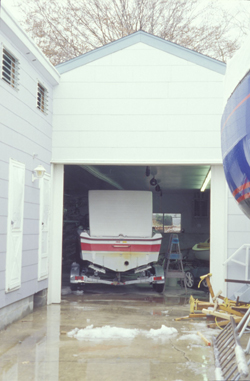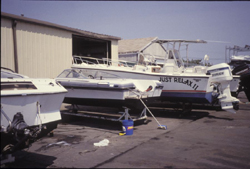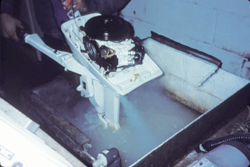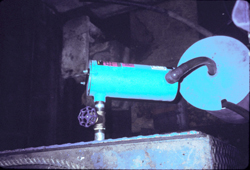|
|
|
Sections
|
|
|
|
|
|
|
|
|
|
|
|
|
|
|
|
|
|
Used
crankcase oil,
automatic transmission fluid, power steering fluid and hydraulic
fluid are all considered used oil and can be mixed and recycled
together.
|
New York Sea Grant's
Marina Pollution Prevention Web Site
Section 1: Mechanical Activities
-
Upland Engine Operations
Potential Environmental Impacts
Working on boat engines has potential environmental impacts. If
engine fluids are not well managed, they may be transported by
stormwater into the marina basin, where they can harm fish and
other aquatic life. If certain fluids are mixed, they may become
subject to hazardous waste requirements and be more expensive
to dispose. Waste fluids from upland engine operations may include:
engine oil, transmission fluid, power steering fluid, brake fluid,
hydraulic fluid and antifreeze, all of which are recyclable liquids.
Many of these fluids can be hazardous, and may pick up contaminants
(e.g., lead from bearings) during use in an engine. Outboard test
tank water may also become contaminated with petroleum hydrocarbons
and other pollutants from prolonged use.
Best Management Practices
- Try to do
major engine work in a designated area with an impermeable surface
away from the water and under cover, if possible.

- Work areas should
have an impermeable surface that can be kept clean by vacuuming
or sweeping, not hosing. Liquid spills should be cleaned up using
absorbent materials.

- Never pour
waste fluids down the drain.
- Recycle fluids
whenever possible. In general, the purer the waste stream, the
higher the value to the recycler. Never mix gasoline, antifreeze,
or chlorinated solvents into used oil because it may cause the
used oil to become a hazardous waste, therefore requiring higher
disposal costs.
- Outboard
test tank water can be kept clean by using a pump and
 filter
system (click
here) or a bioremediation product which uses microscopic organisms
to break down petroleum into water and carbon dioxide. Keeping test tank water clean can help avoid
problems with disposal if the tank has to be emptied or starts
to leak. Clean tank water also eliminates the need for wiping
down motors, saving time and money. filter
system (click
here) or a bioremediation product which uses microscopic organisms
to break down petroleum into water and carbon dioxide. Keeping test tank water clean can help avoid
problems with disposal if the tank has to be emptied or starts
to leak. Clean tank water also eliminates the need for wiping
down motors, saving time and money.

Regulatory Issues
- A hazardous
waste determination must be conducted to establish whether or
not disposal of waste fluids is subject to hazardous waste
regulations [40 CFR 262.11] click
here. A hazardous waste determination must also
be conducted on any materials used to clean a spill. For more
information on New York's Hazardous Waste Regulations and storage
requirements,
click here, pdf.
- If there
is a stormwater discharge from your facility and you perform any
outdoor vessel maintenance or repair outdoors, you may have to
register for a General Permit for the Discharge of Storm Water
Associated with Industrial Activity ("Storm Water General
Permit"). For more information on storm water permitting in New York, click
here.
- If doing
an oil changes, see "Oil Changes," click
here.
- See "Antifreeze"
click here,
to determine how to handle, store and dispose of antifreeze used
to winterize engines.
- Manage soiled
rags as described in "Rags"click
here.
|
|

